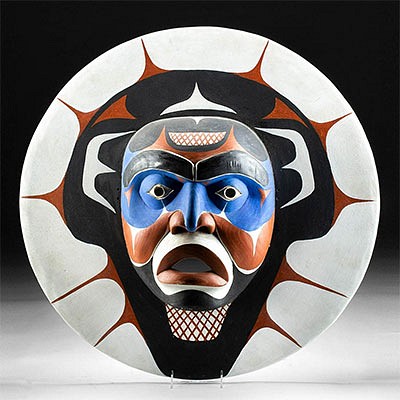18th C. Tahitian Volcanic Stone Poi Pounder
Lot 111
About Seller
Artemis Fine Arts
686 S Taylor Ave, Ste 106
Louisville, CO 80027
United States
Selling antiquities, ancient and ethnographic art online since 1993, Artemis Gallery specializes in Classical Antiquities (Egyptian, Greek, Roman, Near Eastern), Asian, Pre-Columbian, African / Tribal / Oceanographic art. Our extensive inventory includes pottery, stone, metal, wood, glass and textil...Read more
Estimate:
$2,000 - $3,000
Absentee vs Live bid
Two ways to bid:
- Leave a max absentee bid and the platform will bid on your behalf up to your maximum bid during the live auction.
- Bid live during the auction and your bids will be submitted real-time to the auctioneer.
Bid Increments
| Price | Bid Increment |
|---|---|
| $0 | $25 |
| $300 | $50 |
| $1,000 | $100 |
| $2,000 | $250 |
| $5,000 | $500 |
| $10,000 | $1,000 |
| $20,000 | $2,500 |
| $50,000 | $5,000 |
| $100,000 | $10,000 |
| $200,000 | $20,000 |
About Auction
By Artemis Fine Arts
Mar 18, 2021
Set Reminder
2021-03-18 10:00:00
2021-03-18 10:00:00
America/New_York
Bidsquare
Bidsquare : Pre-Columbian | Tribal | Oceanic
https://www.bidsquare.com/auctions/artemis-gallery/pre-columbian-tribal-oceanic-6520
Featuring Pre-Columbian, Native American, African / Tribal, Oceanic, much more. All items have been legally acquired and are legal to sell. Convenient in-house shipping. Artemis Fine Arts info@artemisgallery.com
Featuring Pre-Columbian, Native American, African / Tribal, Oceanic, much more. All items have been legally acquired and are legal to sell. Convenient in-house shipping. Artemis Fine Arts info@artemisgallery.com
- Lot Description
South Pacific, French Polynesia, Tahiti, ca. 18th century CE. A stunning and sumptuous pounder, hand-carved from a porous volcanic stone, used for pulverizing taro root into poi. The fine tool displays a T-shaped handle with three ridges, one at each side and another in the middle to increase the gripping ability of the wielder. The hefty pounding surface is ovoid in form and gradually widens downwards from the slender neck. The neck and handle are incredibly smooth from use, while the rough pounding surface is consistent with finely-aged volcanic stone. Size: 3.75" W x 5.125" H (9.5 cm x 13 cm); 7.125" H (18.1 cm) on included custom stand.
Poi pounders, alongside adzes, were the most important stone tools in Polynesia and the Hawaiian Islands (Europeans introduced steel weapons). They are used for pounding cooked taro root into poi, a staple of the islander diet. Taro root was steamed in an earthen oven, peeled using shells, and placed onto a slab of wood to be pounded. The pounded results were blended with water into a highly nutritious paste. Traditional calabash bowls were used as containers to hold poi mixtures, and traveling royalty were accompanied by their own poi maker, with his or her own poi-making implements like this one.
A similar example hammered for 15,000 Euro ($17,773) at Christie's, Paris African and Oceanic Art Auction (Live Auction 5537, December 4, 2008, lot 58).
Provenance: private Newport Beach, California, USA collection
All items legal to buy/sell under U.S. Statute covering cultural patrimony Code 2600, CHAPTER 14, and are guaranteed to be as described or your money back.
A Certificate of Authenticity will accompany all winning bids.
We ship worldwide and handle all shipping in-house for your convenience.
#161995Surface wear and abrasions commensurate with age including small nicks to handle, neck, body, and pounding head, with some light discoloration. Otherwise, intact and excellent. Nice earthen deposits throughout.Condition
- Shipping Info
-
All shipping is handled in-house for your convenience. Your invoice from Artemis Gallery will include shipping calculation instructions. If in doubt, please inquire BEFORE bidding for estimated shipping costs for individual items.
-
- Buyer's Premium



 EUR
EUR CAD
CAD AUD
AUD GBP
GBP MXN
MXN HKD
HKD CNY
CNY MYR
MYR SEK
SEK SGD
SGD CHF
CHF THB
THB














